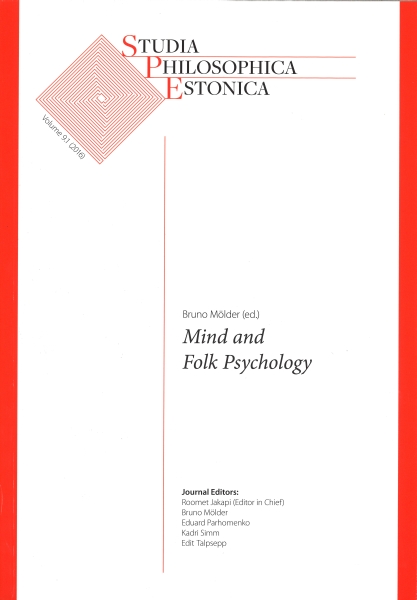No Joint Ownership! Shared Emotions Are Social-relational Emotions
DOI:
https://doi.org/10.12697/spe.2016.9.1.05Keywords:
social cognition, social relationships, relational models theory, shared mental states, collective intentionality, joint ownership thesisAbstract
There are cases of emotion that we readily describe as 'sharing emotions with other people.' How should we understand such cases? Joel Krueger has proposed the Joint Ownership Thesis (JOT): the view that two or more people can literally share the same emotional episode. His view is partly inspired by his reading of Merleau-Ponty -- arguably Merleau-Ponty advocates a version of JOT in his "The child's relations with others." My critical analysis demonstrates that JOT is flawed in several respects: 1) It involves a vague account of joint subjects; 2) It relies on a confusion between phenomenological and ontological levels of analysis. When these are clearly distinguished, Krueger's phenomenological analysis contradicts JOT understood as an ontological claim; 3) It relies on a highly problematic coupling-constitution inference; 4) It relies on a shift from the claim that the child and the caregiver jointly realize an emotion, to the claim about joint ownership, which is a non sequitur. I argue that we can reach a better understanding of the phenomenon of shared emotions by bringing in another level of analysis: that of social relationships. I propose that shared emotions are a special case of social-relational emotions, typically arising within and/or giving rise to communal relationships.
References
Adams, F. R. and Aizawa, K. (2010). The value of cognitivism in thinking about extended cognition, Phenomenology and the Cognitive Sciences, 9(4): 579-603.
Adams, F. R. and Aizawa, K. (2008). The Bounds of Cognition, Blackwell, Malden (MA).
Adams, F. R. and Aizawa, K. (2001). The bounds of cognition, Philosophical Psychology, 14(1): 43-64.
Aizawa, K. (2010). The coupling-constitution fallacy revisited, Cognitive Systems Research, 11(4): 332-342.
Berscheid, E. (2004). The greening of relationship science, in H.T. Reis and C.E. Rusbult (eds), Close Relationships: Key Readings, Psychology Press, New York & Hove, pp. 30-41.
Berscheid, E. and Ammazzalorso, H. (2003), Emotional experience in close relationships, in G. J. I. Fletcher, and M. S. Clark (eds), Blackwell Handbook of Social Psychology: Interpersonal Processes, Blackwell Publishing, Malden (MA), pp. 308-330.
Blakemore, S.-J., Wolpert, D. M. and Frith, C. D. (1998). Central cancellation of self-produced tickle sensation. Nature Neuroscience, 1: 635 - 640.
Bratman, M. (1999). Faces of Intention: Selected Essays on Intention and Agency, Cambridge University Press, Cambridge.
Butler, E. A. (2011). Temporal interpersonal emotion systems: The “TIES” that form relationships, Personality and Social Psychology Review, 15(4): 367-393.
Clark, A. (2010). Memento’s revenge: The extended mind, extended, in R. Menary (ed), The Extended Mind, MIT Press, Cambridge (MA), pp. 43-66.
Clark, M.S., Fitness, J. and Brisette, I. (2003). Understanding people’s perceptions of relationships is crucial to understanding their emotional lives, in G. J. I. Fletcher and M. S. Clark (eds), Blackwell Handbook of Social Psychology: Interpersonal Processes, Blackwell Publishing, Malden (MA), pp. 308-330.
Clark, A. and Chalmers, D. (1998). The extended mind, Analysis, 58(1): 7-19.
Colombetti, G. and Krueger, J. (2015). Scaffoldings of the affective mind, Philosophical Psychology, 28(8): 1157-1176.
Fiske, A. P. (1991). Structures of Social Life: The Four Elementary Forms of Human Relations: Communal Sharing, Authority Ranking, Equality Matching, Market Pricing, Collier Macmillan Canada, Maxwell Macmillan International, New York, Toronto.
Fiske, A. P. (1992). The four elementary forms of sociality: Framework for a unified theory of social relations. Psychological Review, 99(4): 689-723.
Fiske, A. P. (2002). Moral emotions provide the self-control needed to sustain social relationships, Self and Identity, 1: 169-175.
Fiske, A. P. and Haslam, N. (1996). Social cognition is thinking about relationships. Current Directions in Psychological Science, 5: 143-148.
Gallotti, M. and Frith, C. (2013). Social cognition in the we-mode, Trends in Cognitive Sciences 17(4): 160-165.
Gilbert, M. (2006). A Theory of Political Obligation, Oxford University Press, Oxford.
Hurley, S. (2010). Varieties of externalism, in R. Menary (ed), The Extended Mind, MIT Press, Cambridge (MA), pp. 101-154.
Kagan, A. and Lassiter, C. (2013). The coupling-constitution fallacy: Much ado about nothing, Pragmatics & Cognition, 21(1): 178-192.
Keltner, D. and Haidt, J. (1999). Social functions of emotions at four levels of analysis, Cognition and Emotion, 13(5): 505-521.
Krueger, J. (2013). Merleau-Ponty on shared emotions and the joint ownership thesis, Continental Philosophy Review, 46(4): 509-531.
Krueger, J. (2014). Varieties of extended emotions, Phenomenology and the Cognitive Sciences, 13(4): 533-555.
Manstead, A. S. R. (2006.) The social nature of emotion and the emotional nature of the social, in P. A. M. van Lange (ed), Bridging Social Psychology: Benefits of Transdisciplinary Approaches, Mahwah, NJ: Lawrence Erlbaum, pp. 213-218.
Menary, R. (2006). Attacking the bounds of cognition, Philosophical Psychology, 19(3): 329-344.
Menary, R. (Ed.) (2010). The Extended Mind, MIT Press, Cambridge (MA)
Merleau-Ponty, M. (1964). The child’s relations with others, in J. Edie (ed), The Primacy of Perception, Northwestern University Press, Evanston, pp. 96-155.
Noë, A. (2004). Action in Perception, MIT Press, Cambridge (MA).
Ross, D. and Ladyman, J. (2010). The alleged coupling-constitution fallacy and the mature sciences, in R. Menary (ed), The Extended Mind, MIT Press, Cambridge (MA), pp. 155-166.
Schweikard, D. P. and Schmid, H. B. (2013). Collective intentionality, in E. N. Zalta (ed), Stanford Encyclopedia of Philosophy (Summer 2013 edition).
URL: http://plato.stanford.edu/archives/sum2013/entries/collective-intentionality/
Shergill, S. S., Samson, G., Bays, P. M., Frith, C. D., & Wolpert, D. M. (2005). Evidence for sensory prediction deficits in schizophrenia. The American Journal of Psychology, 162(12): 2384-2386.
Tuomela, R. and Miller, K. (1988). We-intentions, Philosophical Studies, 53(3): 367-389.





